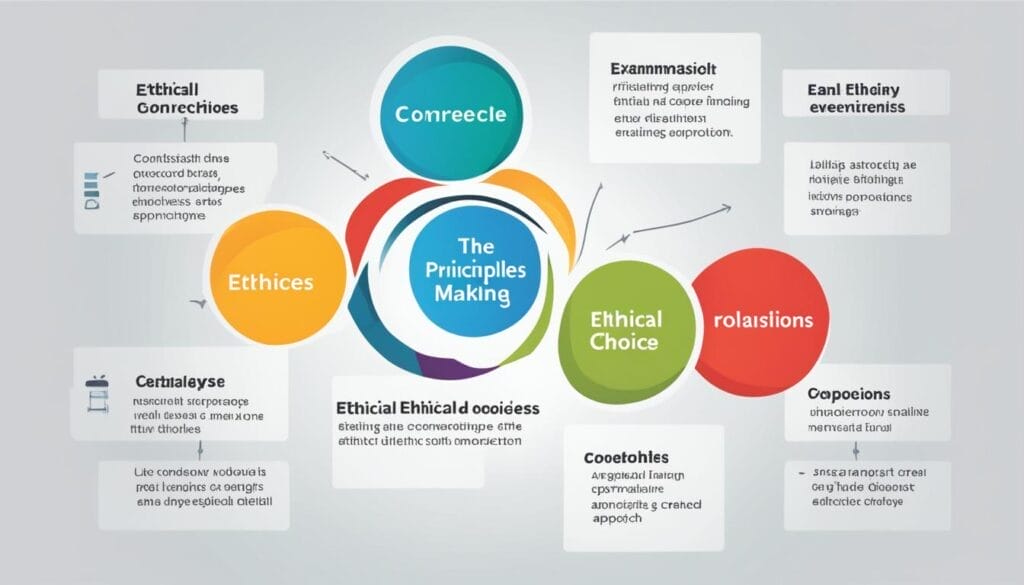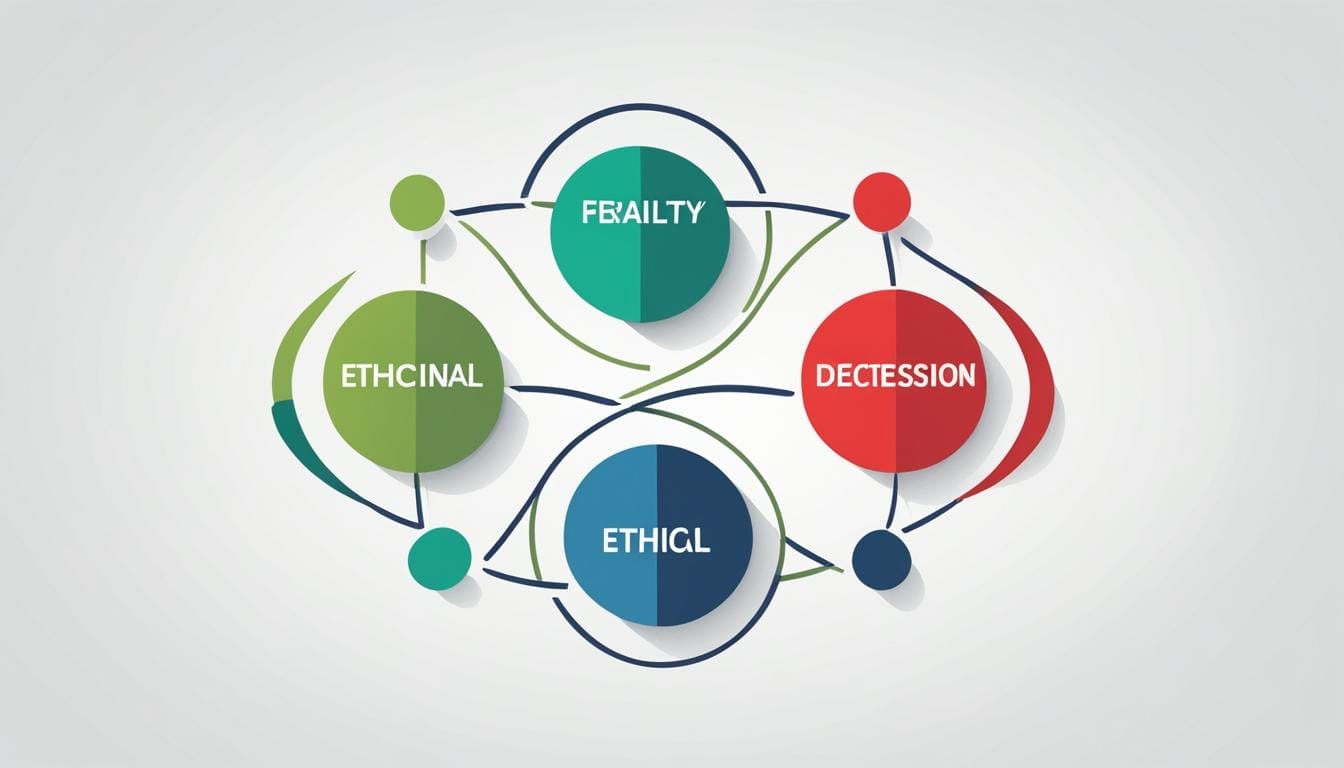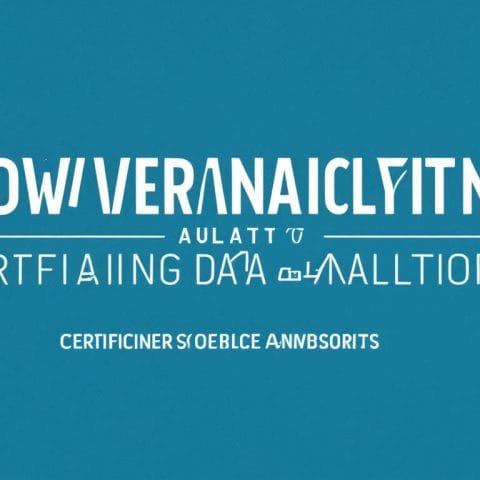In today’s digital era, leadership ethics play a crucial role in guiding ethical decision-making. As leaders, it is essential to uphold ethical values and integrity in leadership to foster a culture of ethical behavior and ensure the well-being of our organizations and communities.
Leadership ethics encompass a range of skills and principles, such as moral leadership, ethical leadership principles, and integrity in management. By practicing these values, leaders can navigate the complexities of the digital age and make decisions that consider the broader impact on their teams and society as a whole.
Key Takeaways:
- Leadership ethics are essential for guiding ethical decision-making in the digital era.
- Upholding ethical values and integrity in leadership fosters a culture of ethical behavior.
- Moral leadership and ethical leadership principles are key skills for ethical decision-making.
- Integrity in management ensures the well-being of organizations and communities.
- Leaders must consider the broader impact of their decisions on their teams and society.
The Role Of Leadership In The Digital Era
Leadership in the digital age presents unique challenges, as decisions can have wide-ranging consequences for businesses and organizations. In this era of rapid technological advancement, leaders must possess the necessary skills and qualities to navigate the complex landscape and make ethical decisions that prioritize the well-being of their teams and the community.
Transparency is a core principle that guides ethical decision-making in the digital era. Leaders must strive to create an environment of openness and honesty, where information is shared freely and decisions are made with clarity. By maintaining transparency, leaders can foster trust and ensure that their decisions are understood and accepted.
Transparency in Action:
“As a leader in the digital era, it is essential to cultivate a culture of transparency. By openly communicating with my team and sharing relevant information, I am able to gain their trust and make more informed decisions.”
Responsibility is another vital aspect of leadership in the digital era. Leaders must consider the broader impact of their actions, not only on their organization but also on society as a whole. This requires a proactive approach to address ethical dilemmas and actively seek solutions that benefit both the business and the community.
Responsibility in Practice:
“As a leader, I take responsibility for the consequences of my decisions. I consider how my actions will affect not only my organization but also the wider community. By doing so, I can make choices that align with our ethical values and promote the greater good.”
Empathy plays a crucial role in ethical decision-making. Leaders must cultivate an understanding of how their choices can impact others, both within and outside their organization. By putting themselves in others’ shoes and considering different perspectives, leaders can make decisions that demonstrate compassion and empathy.
Empathy in Leadership:
“Empathy allows me to make decisions that consider the well-being of my team members, customers, and stakeholders. By understanding their needs and perspectives, I can create an environment that fosters collaboration, engagement, and overall success.”
By practicing these principles of transparency, responsibility, and empathy, leaders can make informed and ethical decisions in the digital era. This not only benefits their organization but also contributes to the overall betterment of society.
| Principle | Actions |
|---|---|
| Transparency | Openly share information and decisions with the team |
| Responsibility | Consider the broader impact of decisions on society |
| Empathy | Understand how choices can affect others and display compassion |
Three Key Principles To Guide Ethical Decision-Making

Leaders must focus on three key principles for ethical decision-making: transparency, responsibility, and empathy. These principles are the building blocks of ethical leadership, ensuring that decisions are made with integrity and consideration for others.
Transparency is a fundamental principle that creates trust and fosters open communication within an organization. By being transparent about values and ethical standards, leaders can establish a culture of honesty and accountability.
Responsibility requires leaders to consider the broader impact of their decisions on society. Ethical leaders understand that their choices can have far-reaching consequences and strive to make decisions that promote the well-being of all stakeholders.
Empathy plays a vital role in ethical decision-making. By putting themselves in the shoes of others, leaders can better understand how their choices may impact individuals and communities. Empathy allows leaders to make decisions that consider the needs and concerns of others.
“Transparency, responsibility, and empathy are the cornerstones of ethical decision-making. These principles guide leaders in making thoughtful choices that prioritize integrity and the well-being of others.”
By incorporating transparency, responsibility, and empathy into their decision-making processes, leaders can navigate complex ethical dilemmas and uphold ethical standards. These principles not only ensure the ethical behavior of leaders but also create an organizational culture rooted in integrity and trust.
Next, we will explore the importance of trust in business and how ethics forms the foundation for long-term success.
Trust in Business and the Importance of Ethics

Despite negative headlines, public trust in business remains higher than trust in the media and government. Building and maintaining trust requires a strong commitment to ethics. Unethical behavior can have detrimental effects on businesses, making an ethical foundation essential for long-term success. Business leaders and managers are looked to for leadership and guidance, which further emphasizes the importance of upholding the highest ethical standards.
Trust is a valuable currency in the business world. It is the glue that holds relationships together and fosters collaboration. When customers trust a business, they are more likely to make repeat purchases and recommend the company to others. Similarly, employees who trust their leaders are more engaged, motivated, and loyal.
Fostering Trust through Ethical Practices
Trust is not built overnight; it is cultivated through consistent ethical behavior and transparency. Upholding the highest ethical standards establishes a solid ethical foundation on which businesses can thrive.
“Trust is earned when actions meet words.”
Business leaders must lead by example and demonstrate integrity in their decisions and actions. They should prioritize honesty, fairness, and accountability. By consistently adhering to ethical principles, leaders build trust among their employees, customers, investors, and other stakeholders.
Ethics should not be seen as an afterthought or a mere compliance measure. It should be an integral part of the business strategy, guiding decision-making at all levels. Incorporating ethical considerations into business operations fosters trust and creates a positive reputation, distinguishing the company from its competitors.
The Importance of Ethical Leadership
Ethical leadership is crucial for creating a culture of trust within an organization. Leaders set the tone for ethical behavior and establish the expectations for the entire workforce. When leaders prioritize ethical decision-making, they inspire their teams to do the same.
Moreover, ethical leadership extends beyond the confines of the organization. Leaders who demonstrate ethical behavior contribute to the overall well-being of society. They consider the impact of their decisions on stakeholders, the environment, and the community at large.
By upholding the highest ethical standards, business leaders become beacons of trust in the business world. They create a positive ripple effect, influencing other businesses and driving societal change.
The Benefits of Trust in Business
Trust in business has numerous benefits, including:
- Increased customer loyalty and repeat business
- Better employee engagement and productivity
- Enhanced reputation and brand image
- Greater credibility and stakeholder confidence
- Improved partnerships and collaborations
These benefits contribute to the long-term success and sustainability of a business. Trust is a competitive advantage that sets businesses apart in a crowded marketplace.
| Trust in Business | Impact |
|---|---|
| 1. Increased Customer Loyalty | Customers are more likely to remain loyal to a trusted business, leading to repeat purchases and positive referrals. |
| 2. Enhanced Reputation | A reputation for ethical behavior attracts customers, employees, and investors, strengthening the overall brand image. |
| 3. Improved Employee Engagement | When employees trust their leaders and feel valued, they become more engaged, committed, and motivated to contribute to the company’s success. |
| 4. Stronger Partnerships | Other businesses and organizations are more likely to form partnerships and collaborations with trusted entities, leading to mutual benefits and growth opportunities. |
By prioritizing ethical practices and upholding the highest ethical standards, businesses can build trust amongst their stakeholders and reap the rewards of a trusted reputation.
Understanding Ethics and Ethical Decision-Making
Ethical decision-making is a complex process that involves understanding the nature of ethical challenges and gathering all necessary information to make informed choices. Various factors can influence ethical decisions, including the individuals involved, relevant laws, and professional standards.
By analyzing these factors and considering their implications, leaders can develop possible resolutions for ethical dilemmas. It is crucial to evaluate the potential outcomes of these resolutions to ensure their alignment with ethical principles.
Business leaders need to engage in the deliberative system of ethical decision-making, which involves critical thinking and considering different ethical frameworks and theories. By tapping into these resources, leaders can make more-ethical choices and navigate cognitive barriers that might hinder ethical decision-making.
Factors Influencing Ethical Decisions
- Individuals involved: The personal values, beliefs, and moral principles of those involved in the decision-making process can significantly impact the ethical choices made.
- Relevant laws: Compliance with legal regulations and standards is essential in making ethical decisions, ensuring that actions align with legal requirements.
- Professional standards: Different industries and professions have specific ethical standards that must be taken into account when making decisions.
Evaluating Ethical Resolutions
Developing possible resolutions is only the initial step in ethical decision-making. It is crucial to evaluate the outcomes and consequences of each resolution to determine which option aligns with ethical principles and values.
The Deliberative System of Ethical Decision-Making
The deliberative system of ethical decision-making involves a thoughtful and reflective process that considers ethical frameworks and theories to guide decision-making. This system allows leaders to overcome cognitive barriers and biases that might influence their judgment.
Engaging in the deliberative system involves critically evaluating the potential ethical implications of each decision and considering different perspectives and moral theories. By utilizing this system, leaders can make conscious and well-informed ethical choices that prioritize the well-being of individuals and society as a whole.
Image: Cognitive Barriers to Ethical Decision-Making
Creating Value for Society and Ethical Decision-Making
Rather than adhering to simple rules, leaders and managers are encouraged to prioritize creating the utmost value for society. By embracing a utilitarian view, leaders can combine philosophical contemplation with pragmatic decision-making. This approach can inform various managerial choices, including those related to hiring, negotiations, and time management. Overcoming cognitive barriers and engaging in the deliberative system of ethical decision-making enables the pursuit of more ethical options that maximize value for all parties involved.
Blending Philosophical Thought with Pragmatic Decision-Making
Adopting a utilitarian view as a guiding principle acknowledges the significance of evaluating decisions through a lens of maximizing overall welfare. This approach promotes the consideration of the broader impact of choices and strives to create the most value for society as a whole. By combining philosophical thought with practical considerations, leaders can make informed decisions that go beyond short-term gains and prioritize the common good.
“The greatest good for the greatest number.” – Jeremy Bentham
Applying the Utilitarian View in Managerial Decisions
Utilizing a utilitarian perspective in managerial decisions can lead to outcomes that benefit not only the organization but also society at large. Various areas of decision-making can be influenced by this approach:
- Hiring: Emphasizing the selection of candidates who bring diverse perspectives and skills that align with the organization’s mission of creating value for society.
- Negotiations: Prioritizing win-win outcomes that optimize benefits for all parties involved, fostering cooperation and collaborative problem-solving.
- Time Management: Allocating resources and time based on the potential societal impact of different tasks and projects.
Overcoming Cognitive Barriers and Engaging Ethical Decision-Making
When faced with ethical dilemmas, individuals may encounter cognitive biases and challenges that cloud their judgment. Recognizing and overcoming these barriers is crucial for ethical decision-making in pursuit of maximum value creation. By engaging in the deliberative system of ethical decision-making, leaders can navigate complex choices with greater clarity and integrity.
| Utilitarian Approach | Benefits |
|---|---|
| Prioritizes overall welfare and maximum value creation | – Promotes long-term sustainability |
| Considers the broader impact of decisions on society | – Fosters social responsibility and ethical behavior |
| Encourages inclusive decision-making processes | – Enhances diversity and equity |
The Importance of Ethical Leadership in Autonomous Vehicles
The rise of autonomous vehicles brings forth ethical challenges that require careful consideration and ethical leadership to address. One of the pressing dilemmas in this field is determining how autonomous cars should prioritize saving occupants or pedestrians in unavoidable crashes. Ethical decision-making plays a critical role in finding the right balance between safety and fairness.
“The ethical implications of programming autonomous vehicles to make life-and-death decisions are complex and require ethical leadership.”
Autonomous vehicle manufacturers must prioritize ethical leadership to navigate these challenges responsibly. By incorporating ethical principles into the programming of autonomous vehicles, leaders can ensure that decision-making aligns with ethical values. This includes considerations of human lives, societal impact, legal regulations, and collective well-being.
Achieving ethical decision-making in autonomous vehicles involves value creation and considering the broader impact of choices. Leaders in the autonomous vehicle industry must take into account the consequences of their programming decisions on individual lives, communities, and the environment.
An effective approach for ethical leadership in autonomous vehicles would be to embrace value creation as a guiding principle. By prioritizing the creation of value for society, leaders can make decisions that aim to benefit the greater good. This involves evaluating the potential positive and negative impacts of autonomous vehicles on various stakeholders and making choices that maximize overall societal welfare.
Ensuring ethical leadership in the autonomous vehicle industry is essential to instill public trust and confidence. By fostering transparent decision-making processes and integrating ethical considerations into the technology, leaders can demonstrate their commitment to ethical behavior and responsible innovation.
An image that highlights the technological advancements in autonomous vehicles can be found below:
Maintaining an Ethical Organization for Long-Term Success
Creating and sustaining an ethical organization is crucial for long-term success. Ethical behavior establishes a strong foundation built on trust, integrity, and responsible decision-making. Business leaders play a vital role in shaping the ethical culture of their organizations and ensuring that ethical values are upheld at all levels.
“Ethics is not just about complying with laws and regulations. It’s about doing what is right, even when no one is watching.”
Prioritizing Ethical Decision-Making
Maintaining an ethical organization begins with mastering the steps of ethical decision-making. By following a comprehensive framework, leaders can ensure that ethical considerations are given due diligence in every decision they make. Here are the key steps:
- Clearly Define Challenges: Identifying the ethical challenges at hand is the first step in making ethical decisions. This involves recognizing potential conflicts, dilemmas, or situations that may require ethical scrutiny.
- Identify Required Information: Gathering all relevant information is essential for making informed ethical decisions. This includes examining legal requirements, organizational policies, and considering the potential consequences of different choices.
- List Concerns: It is crucial to identify any concerns that may arise from different decision options. This helps leaders evaluate the potential impact on stakeholders and determine the ethical implications of each choice.
- Develop Possible Resolutions: Brainstorming and evaluating various resolutions allows leaders to explore different approaches to address ethical challenges. This step encourages creativity and open-mindedness in problem-solving.
- Evaluate Outcomes: Assessing the potential outcomes of each resolution assists leaders in understanding the short-term and long-term effects on stakeholders and the organization as a whole.
- Make Recommendations: Based on the evaluation of outcomes, leaders can make recommendations that prioritize ethical values and principles. These recommendations should align with the organization’s ethical foundation and long-term goals.
“Ethical decision-making requires active engagement, critical thinking, and a genuine commitment to doing what is right.”
Trust and Ethical Leadership
Implementing ethical decisions is crucial for building and retaining trust within an organization. Trust is the cornerstone of relationships between team members, executives, shareholders, and consumers. When ethical behavior is prioritized, it creates a culture of transparency, collaboration, and integrity. Trust empowers employees, drives customer loyalty, and contributes to an organization’s long-term success.
“Trust takes years to build, seconds to break, and forever to repair.” – Warren Buffett
Organizations that prioritize ethics establish themselves as industry leaders, gain a competitive advantage, and attract top talent. Ethical leadership fosters employee engagement, innovation, and a positive work environment. It demonstrates a commitment to the well-being of all stakeholders and contributes to the overall success and sustainability of the organization.
Key Benefits of an Ethical Organization
| Benefits | Description |
|---|---|
| Enhanced Reputation | An ethical organization builds a strong reputation based on trust and integrity, which attracts customers, partners, and investors. |
| Increased Employee Satisfaction | An ethical culture fosters a positive work environment, leading to higher employee satisfaction, retention, and productivity. |
| Better Risk Management | By considering ethical implications in decision-making, organizations can identify and prevent potential legal, financial, and reputational risks. |
| Customer Loyalty | Customers are more likely to support businesses that align with their ethical values, leading to increased loyalty and repeat business. |
| Attracting Top Talent | Highly skilled professionals are drawn to organizations that prioritize ethics, creating a competitive advantage in attracting top talent. |
“An ethical organization not only benefits society but also reaps the rewards of long-term success.”
By maintaining an ethical foundation, organizations can avoid integrity pitfalls, foster a culture of trust and transparency, and position themselves for sustainable growth and success in an ever-evolving business landscape.
Conclusion
Leadership ethics play a crucial role in ethical decision-making and integrity in management. In the digital era, leaders face unique challenges that demand the practice of transparency, responsibility, and empathy. By embracing these principles and considering the broader impact of their decisions, leaders can not only create value for society but also maintain the trust of their teams and stakeholders.
Adhering to the highest ethical standards is paramount for long-term success and the overall well-being of organizations. Leaders must navigate the complexities of the digital age by upholding ethical behavior and making decisions that prioritize the best interests of both the organization and the community it serves. Through ethical leadership, organizations can foster trust and build lasting relationships based on integrity.
Integrity in management goes beyond individual actions; it permeates the entire organizational culture. Creating a culture of ethical behavior starts at the top and cascades down to every level of the organization. When leaders model ethical behavior and make decisions with integrity, they inspire others to follow suit, thereby creating a positive and ethical work environment. Such an environment fosters collaboration, innovation, and a commitment to doing the right thing.
In conclusion, leadership ethics and ethical decision-making are essential components of effective management. By embracing transparency, responsibility, and empathy, leaders can navigate the challenges of the digital era, create value for society, and ensure the long-term success of their organizations. Upholding the highest ethical standards not only benefits the organization but also contributes to a more ethical and sustainable future.
FAQ
What are the key principles of ethical decision-making in leadership?
The key principles of ethical decision-making in leadership are transparency, responsibility, and empathy. Transparency involves being open about values and ethical standards. Responsibility requires considering the broader impact of decisions on society. Empathy allows leaders to understand how choices can affect others.
Why is trust important in business?
Trust is important in business because it is essential for building and maintaining relationships with team members, executives, shareholders, and consumers. Unethical behavior can have detrimental effects on businesses, making an ethical foundation crucial for long-term success.
What factors influence ethical decision-making?
Factors that influence ethical decision-making include the individuals involved, relevant laws, and professional standards. It is essential for business leaders to engage in the deliberative system of ethical decision-making to make more-ethical choices.
How can ethical decision-making create value for society?
Ethical decision-making can create value for society by adopting a utilitarian view that blends philosophical thought with pragmatic decision-making. This approach informs managerial decisions that maximize value for all parties involved.
What role does ethical leadership play in the autonomous vehicle industry?
Ethical leadership is crucial in the autonomous vehicle industry to address complex ethical dilemmas, such as determining how cars should prioritize saving occupants or pedestrians in unavoidable crashes. By prioritizing value creation and considering the broader impact of decisions, leaders in this industry can navigate these challenges ethically.
How can organizations maintain an ethical foundation for long-term success?
Organizations can maintain an ethical foundation for long-term success by mastering the steps of ethical decision-making, including defining challenges, identifying required information, listing concerns, developing possible resolutions, evaluating outcomes, and making recommendations. Implementing ethical decisions is crucial for building and retaining trust among team members, executives, shareholders, and consumers.





